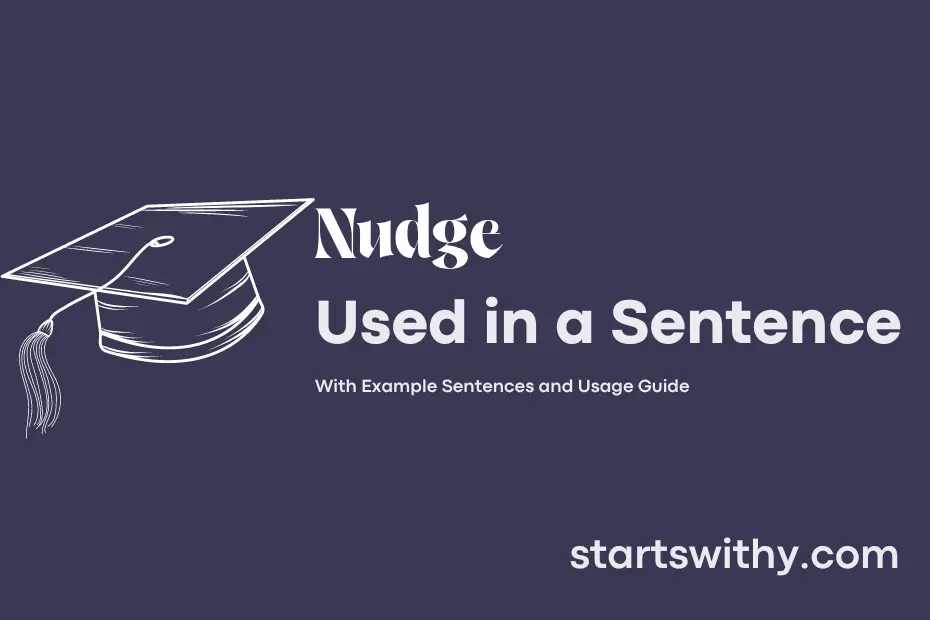Have you ever received a gentle push in the right direction to help you make a decision or take a certain action? That’s essentially what a “nudge” is – a subtle way of influencing behavior without imposing strict rules or mandates.
In various aspects of our lives, nudges are used to guide choices that benefit individuals or society as a whole. These subtle prompts can lead to positive outcomes by steering people towards better decisions, ultimately improving overall well-being.
7 Examples Of Nudge Used In a Sentence For Kids
- Nudge the ball gently with your foot.
- Give your friend a little nudge to get their attention.
- Can you nudge the door open for me, please?
- Use a small nudge to move the toy car forward.
- Give the swing a soft nudge to make it move.
- You can nudge the sandcastle to make it stronger.
- A gentle nudge from the teacher can remind us to listen.
14 Sentences with Nudge Examples
- Nudge your classmates to join the study group for the upcoming exams.
- Make sure to nudge your professor for clarification if you don’t understand a concept in class.
- Don’t be afraid to nudge your roommate about cleaning up the shared living space.
- Nudge your friend to sign up for that interesting workshop on campus.
- It’s important to nudge yourself to get out of bed early for those morning lectures.
- Nudge your group members to start working on the group project ahead of time.
- Remember to nudge yourself to take regular breaks during study sessions to avoid burnout.
- Nudge your classmates to attend the career fair to explore job opportunities.
- It’s helpful to nudge your friend to proofread your assignment before submitting it.
- Make sure to nudge your lab partner to share their notes from the experiment.
- Nudge yourself to start studying for the final exams well in advance.
- If you’re feeling overwhelmed, don’t hesitate to nudge your counselor for support.
- Nudge your club members to brainstorm ideas for the upcoming event.
- It’s beneficial to nudge your group members to create a shared Google doc for project collaboration.
How To Use Nudge in Sentences?
Nudge means to gently push or encourage someone to take a specific action or make a certain decision. When nudge is used in a sentence, it aims to subtly advise or prompt the recipient to consider an option without being forceful or imposing.
To effectively use nudge in a sentence, follow these steps:
-
Understand the context: Before using nudge, have a clear understanding of the situation and the desired outcome. Ensure that your intention is to provide guidance or suggestions in a non-intrusive manner.
-
Choose your words wisely: Select words that convey a gentle prompting or suggestion rather than a direct command. Examples of phrases that incorporate nudge could be “Can I give you a friendly nudge in the right direction?” or “Perhaps a little nudge in this direction would be helpful.”
-
Consider the recipient: Tailor your nudge to suit the person you are communicating with. Be mindful of their preferences, emotions, and receptiveness to advice.
-
Be respectful: Use nudge in a polite and respectful manner to avoid coming across as pushy or overbearing. Respect the recipient’s autonomy and decision-making process.
By following these guidelines, you can effectively incorporate nudge in your conversations to gently guide others towards making informed choices. Remember, the goal of a nudge is to influence positively and help individuals make decisions that align with their best interests.
Conclusion
In our everyday lives, we often encounter subtle suggestions or prompts that aim to influence our behavior, known as nudges. Whether it’s a gentle reminder to save energy, a suggestion to opt for a healthier food choice, or a prompt to consider a different perspective, nudges play a significant role in shaping our decisions.
Through strategically crafted sentences and cues, nudges can guide individuals towards making more positive choices without restricting their freedom. By harnessing the power of language and subtle nudges in various contexts, from public health to environmental conservation, we can effectively nudge individuals towards behaviors that benefit themselves and society as a whole. Understanding the impact of these gentle encouragements can help us create environments that promote better decision-making and overall well-being.



